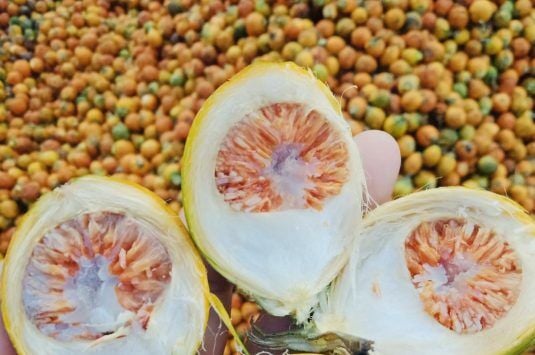Thai betel nut exports hit by India tariffs and Myanmar conflict

Thai betel nut exporters are currently facing significant challenges due to tariff barriers imposed by India and the ongoing armed conflict between the Myanmar military and rebel forces.
Betel nuts, also known as areca nuts, are widely chewed for their stimulating effects across many Asian countries, including Bangladesh, Myanmar, Cambodia, Thailand, and Laos. However, the nuts are classified as a carcinogen that can cause mouth cancer.
In Phatthalung’s Tamot district, dried betel nuts are being sold to local villagers for 8, 10, or 12 baht per kilogramme, depending on their moisture content, with lower moisture content fetching higher prices.
Betel nuts from the Kong Ra district are being exported at 17 baht per kilogramme, while those from Songkhla fetch 15 baht per kilogramme, said a farmer.
“In previous years, the prices were as high as 50-60 baht.”
Two main factors driving the prices down are the armed conflict in Myanmar and the high tariffs imposed by India. The conflict in Myanmar has severely obstructed exports, forcing traders to pay substantial facilitation fees to move their products across the border.
In response, traders had to force growers to sell their products at low prices to offset the fee payments.
Protecting Industries
India, a significant importer of betel nuts, has restricted imports to protect its domestic industries from the impact of foreign products.
President of the Thai Society of Agricultural Engineering Dares Kittiyopas stated that last year’s exports of green and dried betel nuts were valued at 2.55 billion baht.
Over half of these exports, or 54.6%, were sent to Myanmar, followed by Vietnam (18.6%), Bangladesh (11.9%), and India (7.3%).
Dares noted that exports to Myanmar consist mainly of dried betel nuts, most of which are re-exported to India and Bangladesh. India is the world’s largest producer and importer of areca nuts.
Currently, the tariff on the import of areca nuts to India is US$8,140 (294,000 baht) per tonne, with a basic customs duty of 100% ad-valorem.
The import of areca nuts is prohibited if the cost, insurance, and freight (CIF) value is below 351 rupees (153 baht) per kilogramme, except for 100% export-oriented units and units in special economic zones, provided no domestic tariff area (DTA) sales are allowed.
High customs
Dares mentioned that the conflict in Myanmar has forced betel nut traders to pay high customs duties to transport their products across the border into Myanmar.
Additionally, India and Bangladesh have banned the import of areca nuts from Myanmar since June last year, affecting Thai imports that mostly transit through Myanmar to reach these countries, said Dares.
“The government should hold talks with India to ease the protectionist measures under the Asean-India free trade agreement, the Thai-India free trade agreement, and the Bay of Bengal Initiative for Multi-Sectoral Technical and Economic Cooperation, of which Thailand and India are members.”
She also advised the government to explore exporting betel nuts to new markets such as the UK and the UAE, where demand is high among immigrants from India, Bangladesh, Pakistan, Asia, and Africa, reported Bangkok Post.
Latest Thailand News
Follow The Thaiger on Google News:


























